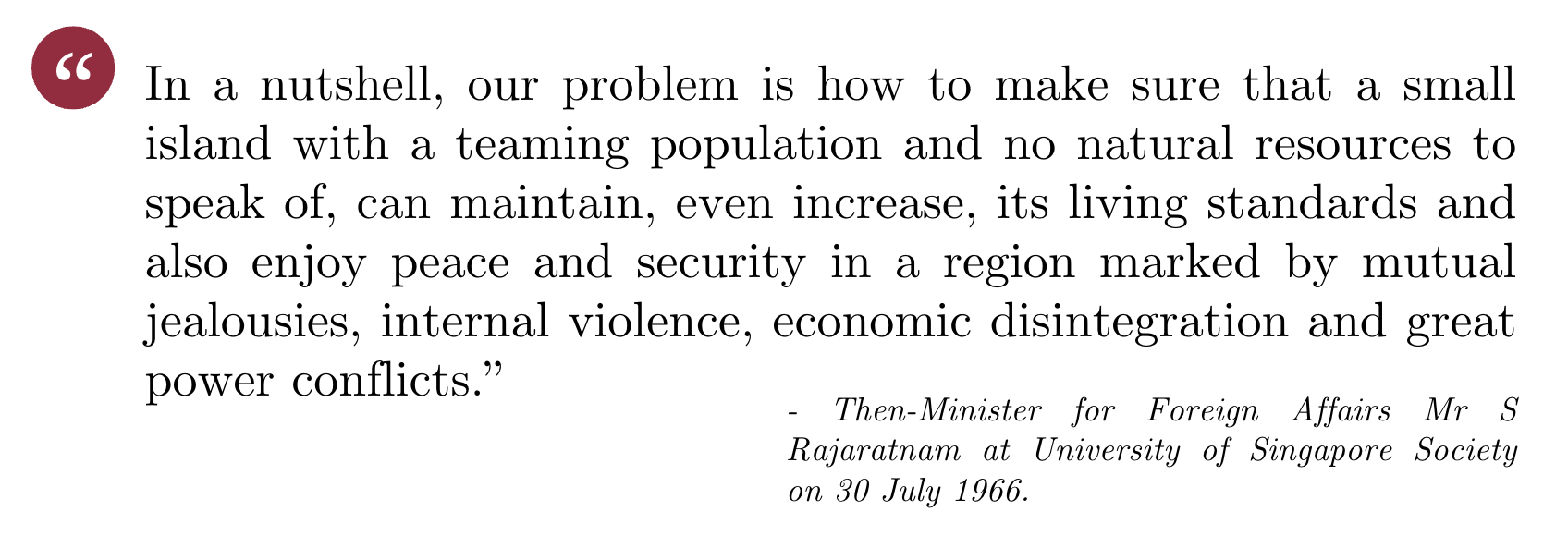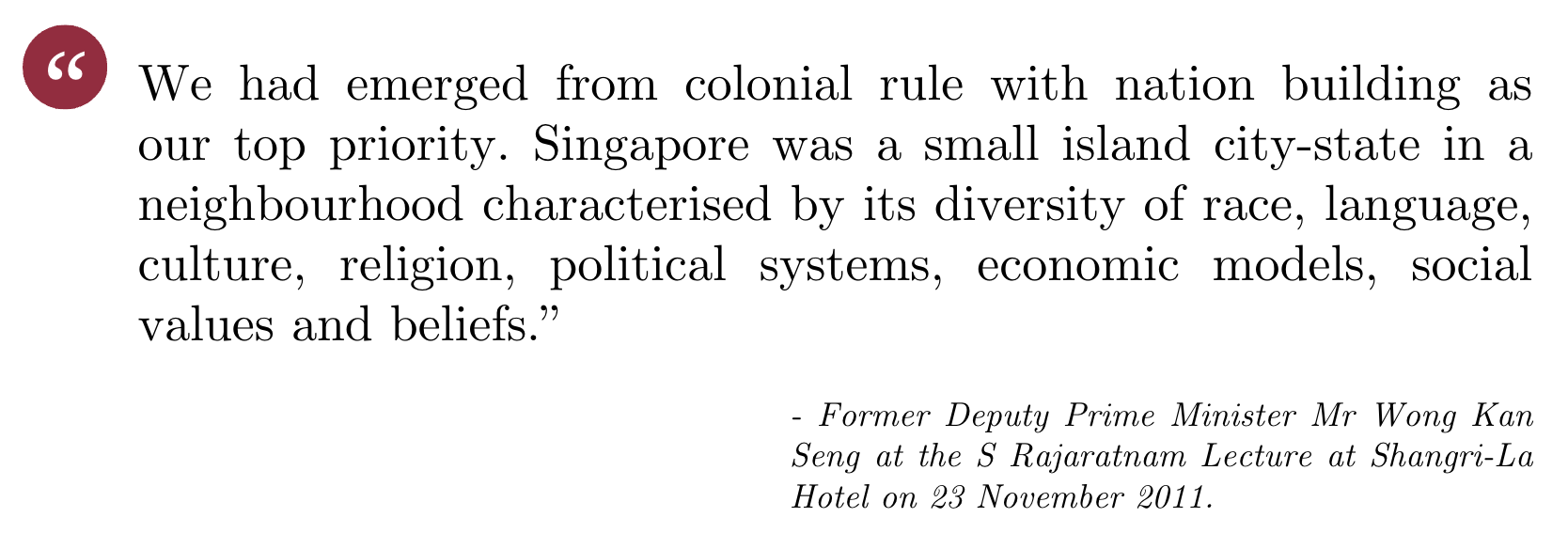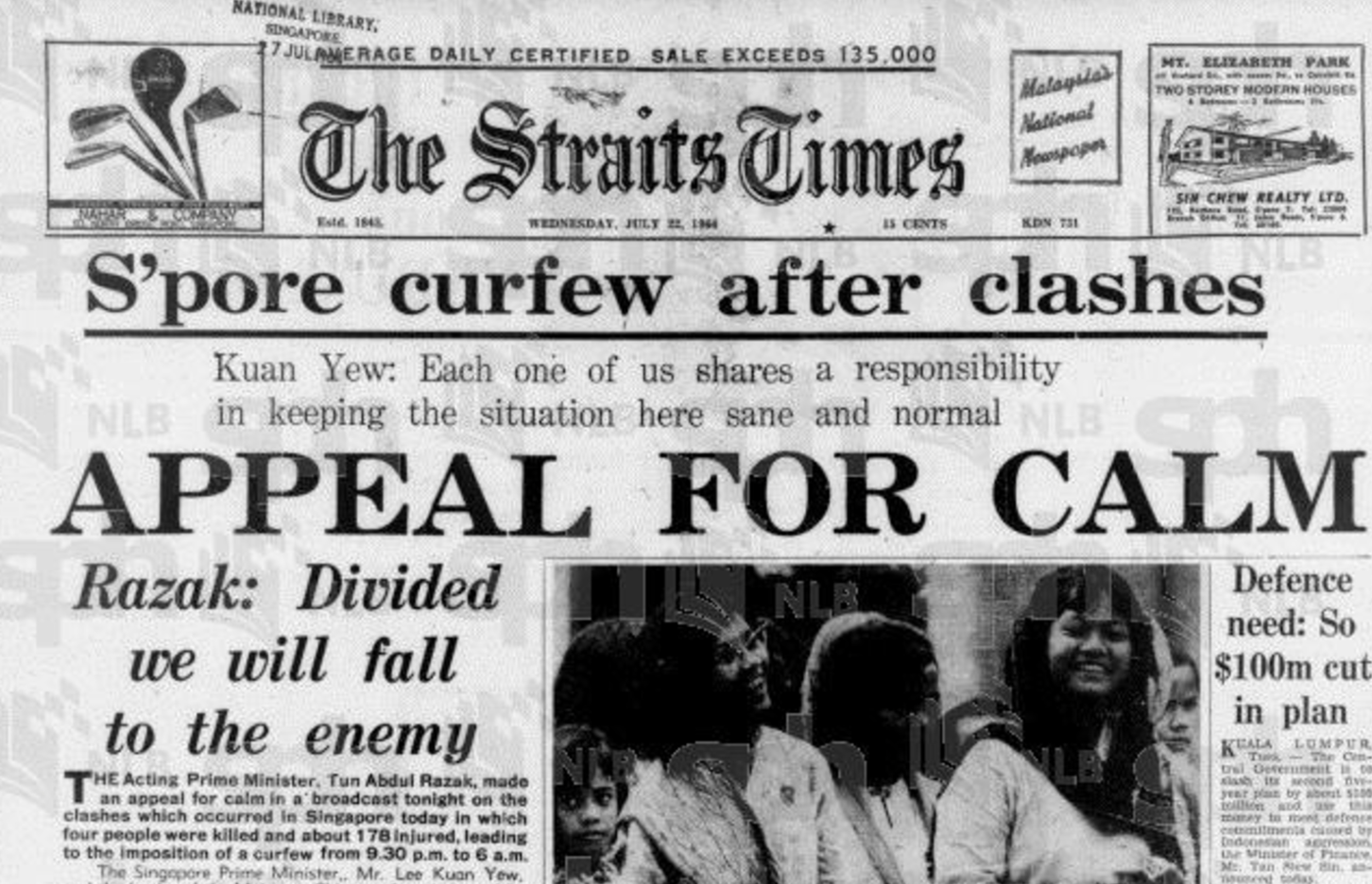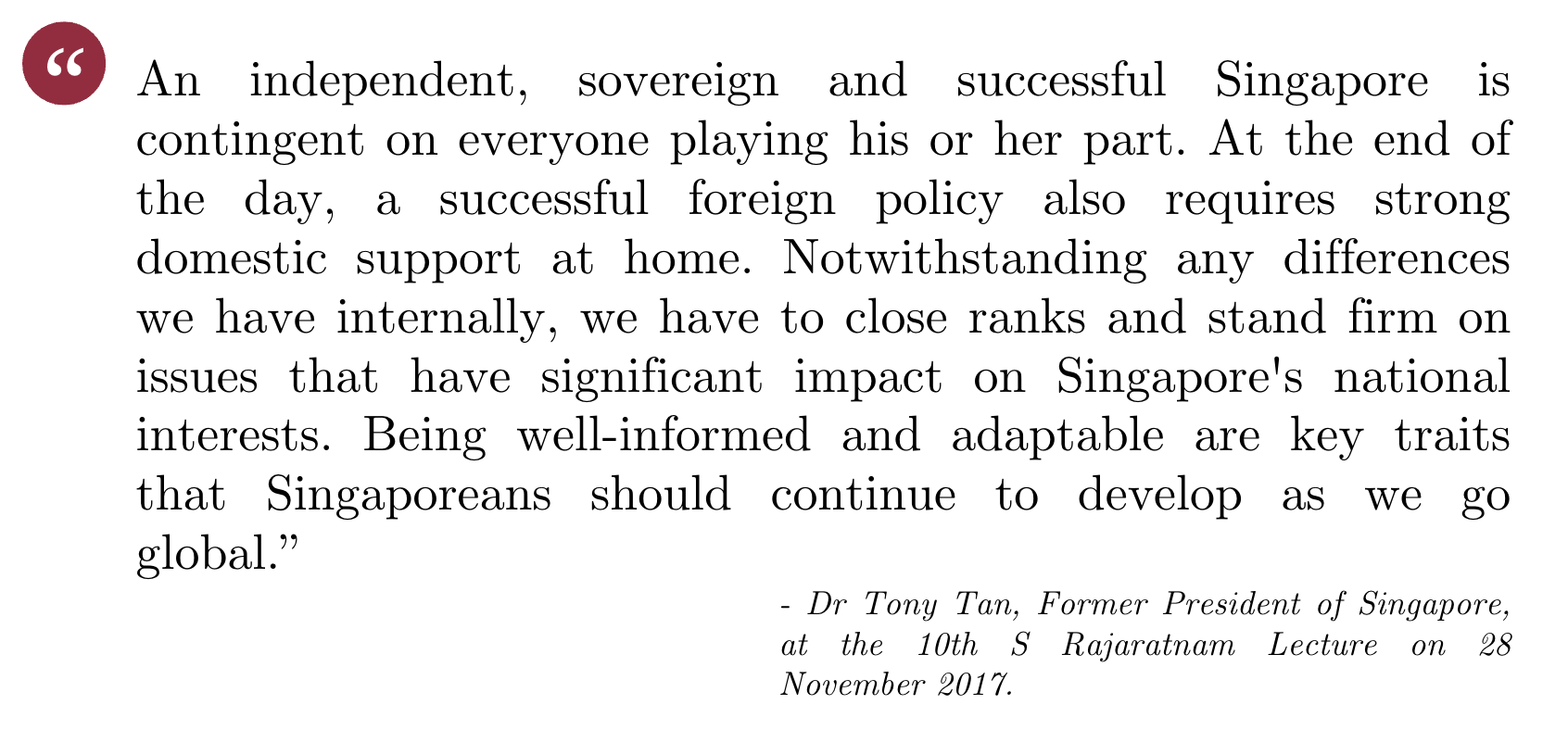Singapore in a Diverse World
7 minutes read
[Last updated on 17 July 2023]

When Singapore was separated from Malaysia and thrust into independence in 1965, our main preoccupation was survival. Our security and foreign policy concerns were compounded by regional and international developments, as well as domestic unrest.

The geopolitical landscape in Southeast Asia was fraught with uncertainty. Surrounded by bigger and more powerful neighbours, we were a small country located in a diverse region where big power conflicts took place.1
In 1965, the Cold War was at its height, and in the region, the Vietnam War had been raging on for several years. The Union of Soviet Socialist Republics (Soviet Union) and Maoist China sought to extend their communist influence over Southeast Asia, including in Singapore. Between 1963 and 1966, Indonesia, led by then-President Soekarno, initiated Konfrontasi (Confrontation) against Singapore, Malaya, Sarawak, Brunei and North Borneo as a protest against the formation of the Federation of Malaysia.
Singapore in the 1950s and 1960s was a turbulent society. There were unrests initiated by trade unions and student groups influenced by political ideology such as the Malayan Communist Party (MCP). In 1964, there were a series of racial riots amidst Konfrontasi and tensions between Singapore, then still a state within Malaysia, and the federal authorities in Kuala Lumpur.
Learn more about Singapore’s defence and security challenges in the 1950s here.
Watch our video on Konfrontasi below:
Learn more about the 1964 racial riots here.
Watch ChannelNewsAsia’s video on Days of Rage: 1964 Race Riots below:
 (Image: Appeal for calm: S’pore curfew after clashes. (1964, July 22). The Straits Times, p. 1. Retrieved from NewspaperSG.)
(Image: Appeal for calm: S’pore curfew after clashes. (1964, July 22). The Straits Times, p. 1. Retrieved from NewspaperSG.)
Against this backdrop, it was important for Singapore to gain recognition for its independence and sovereignty from as many countries as possible.2 Shortly after gaining our independence on 9 August 1965, Singapore applied to join the United Nations on 3 September 1965. On 20 September 1965, a resolution recommending that the General Assembly admit Singapore into the UN was put to a vote in the Security Council. There was unanimous support and Singapore became the 117th UN member state on 21 September 1965.
In his statement upon Singapore’s admission to the UN, then-Minister for Foreign Affairs Mr S Rajaratnam outlined guiding principles of Singapore’s foreign policy which are still relevant today.3
Watch MFA’s video below to learn more about Singapore’s admission into the UN and Mr Rajaratnam’s speech on 21 September 1965:
Even as international developments have evolved, the fundamental challenges of size and geography have not changed for Singapore.4 We will always be a small country in an uncertain world, with no natural resources and only our wits and determination to see us through difficult times. However, Singapore is in a much better position today, compared to when we first gained independence in 1965.5
Geopolitics in our region continues to be shaped by increasingly complex and adversarial relationships between major powers, whose divergent national interests intersect in Southeast Asia.6 This in turn impacts Singapore’s foreign policy.
The external environment has become more troubled amidst worsening relations between the US and China, as well as Russia’s invasion of Ukraine in 2022.7 Since the Russia-Ukraine conflict, the global economy has been facing higher inflation and interest rates. Disruptions to the global supply chain triggered by the COVID-19 pandemic and compounded by the Russia-Ukraine conflict and rising inflation may affect how we get our food and other basic necessities.8
As unresolved disputes and potential flashpoints remain, Singapore could face greater pressure from all sides as geopolitical contestation rises in the region.
The Russia-Ukraine conflict, which has evolved into a proxy war between the US-led West and Russia, also has profound implications for the world and Singapore. The war has spillover effects on regional security in the Asia-Pacific, and has further strained China’s ties with the US and its partners in Asia.9
Learn more about Russia’s invasion of Ukraine here.
Russia’s attack on Ukraine has violated international law, and the fundamental principles of sovereignty and territorial integrity as well as the peaceful resolution of disputes under the United Nations Charter. Such principles are existential for us because they are the very foundation for Singapore’s independence and sovereignty. As a small country, we must stand up for these principles or our own right to exist and prosper as a nation may someday be called into question.10
Going forward, Singapore will continue to be “buffeted by intense rivalry and tensions in the region around us”.11 We must stay united and be psychologically prepared that our region may not be as peaceful and stable over the next few decades. Our resilience as a nation and as a society will be tested. Singapore’s survival will depend on the continued success of Singapore as a country and economy, strong domestic support for our foreign policy, and resilience and unity as one people.12

Bibliography
-
National Archives of Singapore. (1965) Statement of His Excellency Mr S Rajaratnam Foreign Minister of Singapore at the General Assembly on September 21, 1965, on the occasion of Singapore’s admission to the United Nations. ↩
-
Public Service Division. (2015) Heart of Public Service. ↩
-
National Archives of Singapore. (1965) Statement of His Excellency Mr S Rajaratnam Foreign Minister of Singapore at the General Assembly on September 21, 1965, on the occasion of Singapore’s admission to the United Nations. ↩
-
Public Service Division. (2015) Heart of Public Service. ↩
-
Prime Minister’s Office. (2015) PM Lee Hsien Loong at the 8th S Rajaratnam Lecture . ↩
-
Public Service Division. (2015) Heart of Public Service. ↩
-
Baharudin, H. (2022, August 21) NDR 2022: Singapore must be ready for sudden shifts in region: PM Lee. The Straits Times. ↩
-
Baharudin, H. (2022, August 26) Cohesion, trust key for S’pore to succeed amid more uncertain geopolitics: Vivian Balakrishnan. The Straits Times. ↩
-
Baharudin, H. (2022, August 21 NDR 2022: Singapore must be ready for sudden shifts in region: PM Lee.The Straits Times.. ↩
-
Ministry of Foreign Affairs. (2022, February 28) Minister for Foreign Affairs Dr Vivian Balakrishnan’s Ministerial Statement on the situation in Ukraine and its implications. ↩
-
Prime Minister’s Office. (2022, August 8)Prime Minister Lee Hsien Loong’s 2022 National Day Message. ↩
-
Ministry of Foreign Affairs. (2017, November 27) Speech by Dr Tony Tan Keng Yam, Former President of Singapore, at the 10th S Rajaratnam Lecture. ↩

